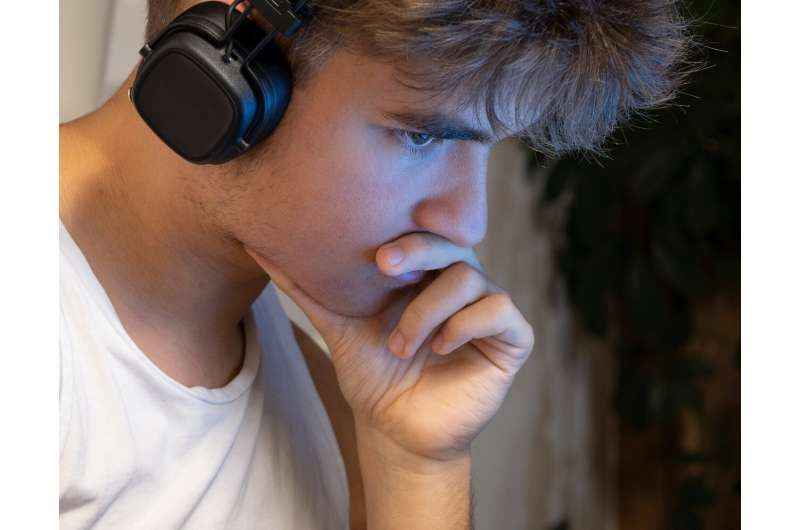This article has been reviewed according to Science X's editorial process and policies. Editors have highlighted the following attributes while ensuring the content's credibility:
fact-checked
trusted source
proofread
Depression in young people being driven by internet addiction, say researchers

Spending excessive time online is causing daytime sleepiness and symptoms of depression in adolescents, a major international study led by researchers at the University of Derby has found.
Dr. Hassam Waheed, from the University's College of Business, Law and Social Sciences, worked with Dr. Peter Macaulay, Senior Lecturer in Psychology, and colleagues in Malaysia and Australia on a meta-analysis of 52 published studies. The results have been published in a report, "Caught in the web: a meta-analysis of internet addiction, excessive daytime sleepiness and depressive symptoms in adolescents," in the journal Information Technology & People.
The study looked at adolescents aged between 10 and 19 years who are more prone to internet addiction given their transitional stage of physical and psychological development. It found that internet-induced daytime sleepiness displaces a host of activities that are known to be beneficial for maintaining mental health, such as day-to-day social interactions and physical activities. This in turn exacerbates their depressive symptoms.
Dr. Macaulay said, "One of the main issues we noticed was that time online is often unstructured; while there may be boundaries for some uses such as time playing games on a PlayStation, this isn't extended to other internet use."
Dr. Waheed added, "We live in an increasingly connected world and there are lots of positives of using the internet, for studies and recreational purposes. Our research supports existing efforts to promote awareness of the consequences of increased internet usage and time spent online, and calls for further action to consider maximizing offline opportunities and interactions."
Interventions recommended by the research team include:
- Encouraging good sleep practices, such as not using devices for 90 minutes before bedtime
- Ensuring devices are not being looked at during the night
- Encouraging more face-to-face interactions
- Supporting more active pursuits such as after-school clubs and sports
The team also advocate the use of focused time online, with an agreed time limit and divided between homework/study and recreation as necessary.
Dr. Macaulay explained, "Such focused time would also foster a healthier relationship with technology through mindful consumption."
At present the medical community is divided on whether internet addiction constitutes a mental disorder. The researchers believe that, with greater understanding of the negative implications of internet addiction, the study will help build the consensus for it to be recognized as a distinct mental disorder.
As part of this project, the researchers are also examining whether the use of virtual reality leads to deviant behaviors offline as well as interventions that could mitigate such behaviors.
More information: Hassam Waheed et al, Caught in the web: a meta-analysis of Internet addiction, excessive daytime sleepiness and depressive symptoms in adolescents, Information Technology & People (2024). DOI: 10.1108/ITP-07-2023-0676



















